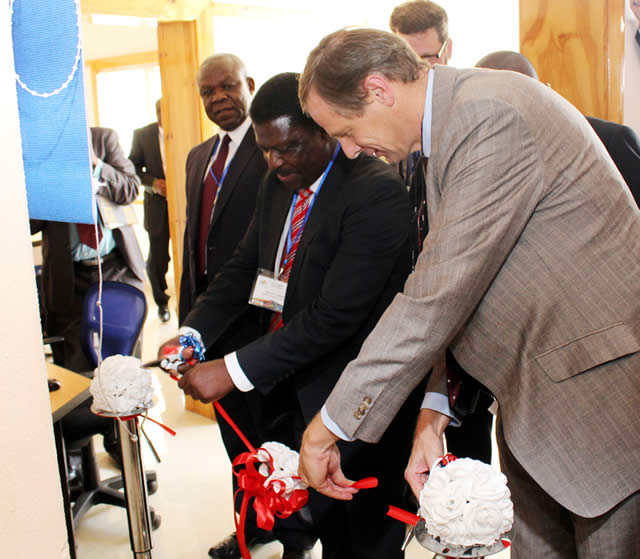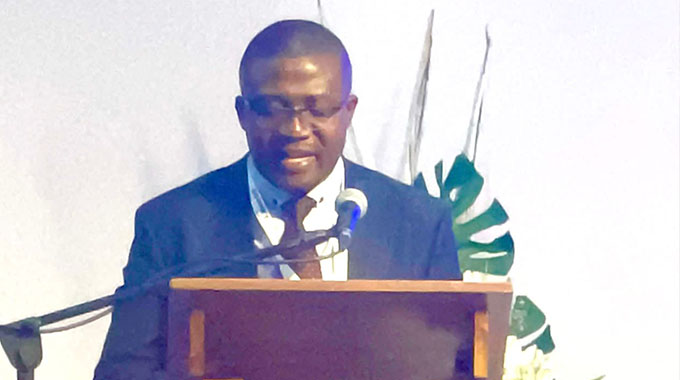Zim companies strike gold


EU Ambassador to Zimbabwe Phillipe Van Damme (right) and Minister of Industry and Commerce Mike Bimha cut a ribbon at the launch of the Zimbabwe-EU Business Information Centre at ZimTrade offices in Bulawayo yesterday. Looking on (from left) is ZimTrade board chairman Lance Jena and the International Trade Centre chief enterprise competitiveness section, international trade centre Marcos Vaena (partly obscured)
Oliver Kazunga Senior Business Reporter—
LOCAL industries struck gold yesterday with the launch of the Zimbabwe-European Union Business Information Centre (Zim-EBIC) in Bulawayo, which allows them to interface directly with the lucrative EU markets. Industry and Commerce Minister Mike Bimha presided over the historic launch, viewed as a critical step towards accessing regional and international markets for the benefit of the economy.
The launch of the Zim-EBIC in Bulawayo follows the unveiling of a similar facility in Harare last August.
“I call upon all trade related institutions in both the private and public sector, including individuals to make maximum use of this business information centre,” Bimha challenged businesses.
“I further implore our companies to value add our raw materials and produce quality products that match international standards. This is the only way we can increase employment, diversify our exports as well as increase export earnings.”
The minister said Zimbabwe continues to face limited disposable income for domestic consumption and financial liquidity challenges, which could be reversed through increased access to regional and international markets.
“Revision of business models towards competitive production of higher quality value-added goods and services with an export orientation is paramount to sustainable economic growth and development,” he said.
“This facility is part of a bigger programme funded by the EU, the €3 million Trade and Private Sector Development Programme (TPSDP) for Zimbabwe, of which the International Trade Centre (ITC) is the implementing agency.”
The minister said the TPSDP was meant to capacitate trade-related institutions, ZimTrade included, to actively contribute to Zimbabwe’s economic recovery through the implementation of the Interim Economic Partnership Agreement (IEPA).
He said TPSDP was in line with national priorities spelt out in the Zim-Asset document and would contribute to enhance the EU’s dialogue with Zimbabwe on trade and private sector development.
“As government, we’re committed to improving Zimbabwe’s trade relations with the EU on a win-win basis. Our signing of the Interim Economic Partnership Agreement (IEPA), with the EU in August 2009, bears testimony to this,” said Bimha.
He said the IEPA would contribute immensely to improved product standards as exporters seek to achieve the EU standards, which also enable them to access global markets.
“It’ll also lead to a secure duty-free market access for the country’s exports such as tobacco, raw cane sugar and horticulture,” he said.
The minister commended EU for the support rendered to Zimbabwe adding the union has supported the country through technical and financial assistance in the formulation and subsequent launch of the National Trade Policy and the Industrial Development Policy.
The two policies were launched in 2012 and are presently being implemented.
ZimTrade chief executive officer Sithembile Pilime said the two information facilities in Harare and Bulawayo formed an integral part of the agency’s trade information centre.
“The Zim-EBIC facility has been instrumental in strengthening our capacity to deliver effective, real-time trade information or market intelligence, which assists exporters and importers alike to conduct business with the EU and other countries,” said Pilime.
“I’m pleased to announce that there’s now a dedicated website for Zim-EBIC, which facilitates access to information from the comfort of your offices in Bulawayo.”
EU Ambassador to Zimbabwe Philippe Van Damme said the EU remains an important market for Zimbabwe.
“The EU remains the second or third most important trading partner of Zimbabwe, and is active in all major sectors of the economy. The EU is a demanding market. We’ve high quality standards, safety regulations, sanitary and phyto-sanitary norms.
“These aren’t protectionist measures in disguise but market driven requirements to protect the EU consumers,” he said, adding that these technical obstacles can be overcome.
“We’ve enough examples from the sub-region, from Zimbabwe, from Bulawayo, of companies that meet these norms and standards and once you penetrate the EU market, this becomes a quality label for the rest of the world.”
Van Damme said they were committed to helping Zimbabwe access the EU market and the Zim-EBIC was a first step to that market and the wider world.
“The Zim-EBIC will provide you with all information required to prospect the EU market, to understand the EU market, to clarify the norms and standards to access the EU market,” he said.










Comments